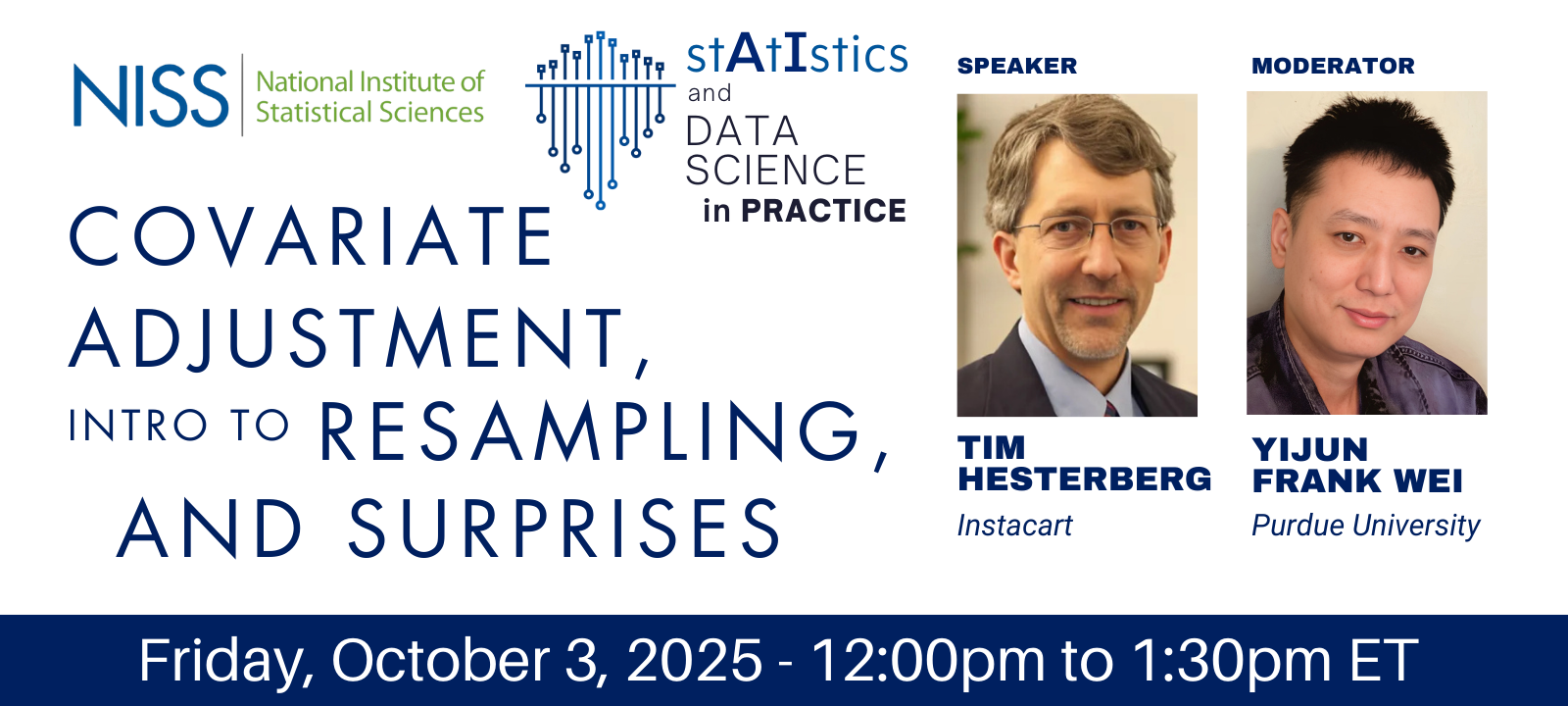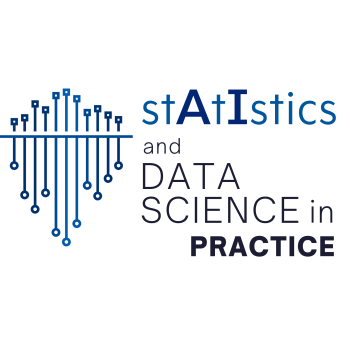Please Note: This event has already taken place, a news story and recording of the event is available here: Covariate Adjustment and Resampling: Insights from Tim Hesterberg in Ai, Statistics & Data Science Webinar | National Institute of Statistical Sciences
Abstract
Covariate Adjustment, Intro to Resampling, and Surprises
Speaker
Tim Hesterberg, Staff Data Scientist at Instacart
Moderator
About the Speaker
 Dr. Tim Hesterberg is a Data Scientist at Instacart, with previous experience as a DS at Google. His career has spanned multiple domains, including positions in academia, energy, and software development. He earned his Ph.D. in Statistics from Stanford University and his B.A. in Mathematics from St. Olaf College, and also spent two years studying in Germany. Dr. Hesterberg is co-author, with Laura Chihara of Carleton College, of Mathematical Statistics with Resampling and R (Wiley), a widely used text in statistics education. He has also contributed to instructional materials on teaching introductory statistics using resampling methods, in collaboration with colleagues including David Moore. His research and applied work cover a wide range of topics, including statistical methodology, electric demand forecasting, web traffic analysis, clinical trials, display advertising, computer vision, and natural phenomena such as streams and earthquakes. He has served in leadership roles with the Canadian Statistical Sciences Institute and the National Institute of Statistical Sciences and was a contributing author to the American Statistical Association’s Guidelines for Undergraduate Statistics Programs. Fun version: https://www.timhesterberg.net/home/tim-hesterberg-bio-sketch
Dr. Tim Hesterberg is a Data Scientist at Instacart, with previous experience as a DS at Google. His career has spanned multiple domains, including positions in academia, energy, and software development. He earned his Ph.D. in Statistics from Stanford University and his B.A. in Mathematics from St. Olaf College, and also spent two years studying in Germany. Dr. Hesterberg is co-author, with Laura Chihara of Carleton College, of Mathematical Statistics with Resampling and R (Wiley), a widely used text in statistics education. He has also contributed to instructional materials on teaching introductory statistics using resampling methods, in collaboration with colleagues including David Moore. His research and applied work cover a wide range of topics, including statistical methodology, electric demand forecasting, web traffic analysis, clinical trials, display advertising, computer vision, and natural phenomena such as streams and earthquakes. He has served in leadership roles with the Canadian Statistical Sciences Institute and the National Institute of Statistical Sciences and was a contributing author to the American Statistical Association’s Guidelines for Undergraduate Statistics Programs. Fun version: https://www.timhesterberg.net/home/tim-hesterberg-bio-sketchAbout the Moderator
 Yijun (Frank) Wei used to be a research associate for NISS, working with the National Agricultural Statistical Service (NASS). He received his Master of Science degree in statistics and Master of Arts degree in Mathematics at University of Michigan-Ann Arbor, and PhD at George Mason. He is currently working as a Senior AI/ML scientist at GM for autonomous driving and large language models.
Yijun (Frank) Wei used to be a research associate for NISS, working with the National Agricultural Statistical Service (NASS). He received his Master of Science degree in statistics and Master of Arts degree in Mathematics at University of Michigan-Ann Arbor, and PhD at George Mason. He is currently working as a Senior AI/ML scientist at GM for autonomous driving and large language models.
About AI, StAtIstics and Data Science in Practice
The NISS AI, Statistics and Data Science in Practice is a monthly event series will bring together leading experts from industry and academia to discuss the latest advances and practical applications in AI, data science, and statistics. Each session will feature a keynote presentation on cutting-edge topics, where attendees can engage with speakers on the challenges and opportunities in applying these technologies in real-world scenarios. This series is intended for professionals, researchers, and students interested in the intersection of AI, data science, and statistics, offering insights into how these fields are shaping various industries. The series is designed to provide participants with exposure to and understanding of how modern data analytic methods are being applied in real-world scenarios across various industries, offering both theoretical insights, practical examples, and discussion of issues.
The AI, Statistics & Data Science in Practice Series during Fall 2025 will focus on the critical role of experimentation in the development and refinement of artificial intelligence (AI) systems: "Incorporating principles of design of experiments and randomization ensures that AI models are trained on reliable, unbiased data, leading to more generalizable and interpretable results. By planning data collection with experimental design and randomization, researchers can minimize bias from uncontrolled variables and improve the statistical validity of their conclusions, whether the models are inferential or predictive. However, in many real-world scenarios, fully controlled experiments may not be feasible. When working with observational data, researchers can employ quasi-experimental techniques to approximate the benefits of randomized trials. These methods help isolate the effects of key variables and adjust for potential confounders, improving the robustness of AI-driven insights. By integrating structured experimentation and causal inference methodologies, AI developers can enhance the reliability and applicability of their models in practice.

Featured Talks:
- Veridical Data Science - Speaker: Bin Yu, October 15,2024
- Random Forests: Why they Work and Why that’s a Problem - Speaker: Lucas Mentch, November 19, 2024
- Causal AI in Business Practices - Speakers: Victor Lo, and Victor Chen, January 24, 2025
- Large Language Models: Transforming AI Architectures and Operational Paradigms - Speaker: Frank Wei, February 18, 2025
- Machine Learning for Airborne Biological Hazard Detection - Speaker: Jared Schuetter, March 11, 2025
- Trustworthy AI in Weather, Climate, and Coastal Oceanography - Speaker: Dr. Amy McGovern, May 13, 2025
- Sequential Causal Inference in Experimental or Observational Settings - Speaker: Aaditya Ramdas, August 26, 2025
- Reinventing Operations Management’s Research and Practice with Data Science - Speaker: David Simchi-Levi, POSTPONED DATE TBD
- Covariate Adjustment, Intro to Resampling, and Surprises - Speaker: Tim Hesterberg, October 3, 2025
- ML and Bayesian geospatial approaches for prediction of opioid overdose deaths - Speaker: Soledad Fernández, November 18, 2025
- AI, Statistics & Data Science Webinar - Speaker: Nancy McMillan, December 2025
Event Type
- NISS Hosted
Host
Cost
Website
Location
Policy

